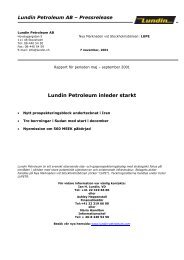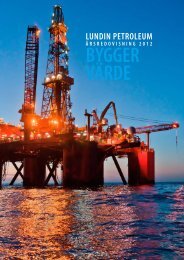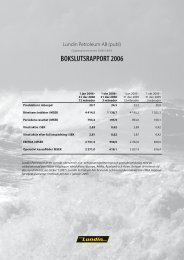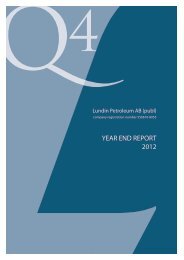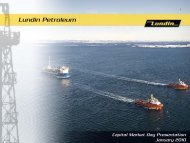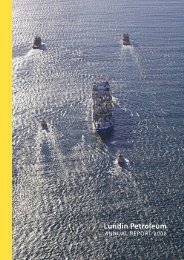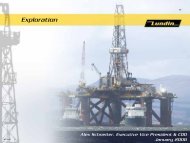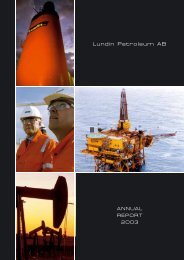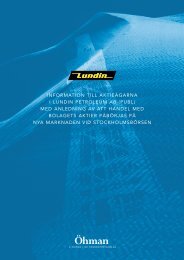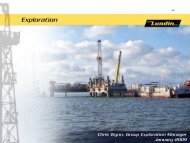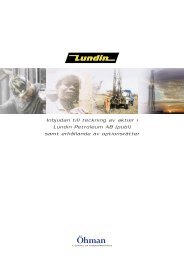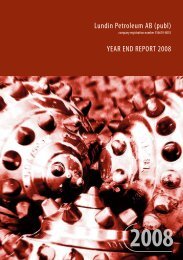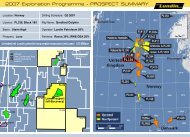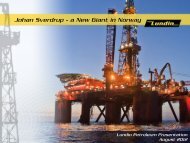Annual Report 2005 (6 MB) - Lundin Petroleum
Annual Report 2005 (6 MB) - Lundin Petroleum
Annual Report 2005 (6 MB) - Lundin Petroleum
Create successful ePaper yourself
Turn your PDF publications into a flip-book with our unique Google optimized e-Paper software.
ACCOUNTING PRINCIPLES<br />
Introduction<br />
In June 2002 the European Union (EU) adopted International<br />
Financial <strong>Report</strong>ing Standards (IFRS) for all companies listed on<br />
a stock exchange within the European Union with eff ect from<br />
1 January <strong>2005</strong>, the adoption date. <strong>Lundin</strong> <strong>Petroleum</strong>’s <strong>Annual</strong><br />
<strong>Report</strong> for <strong>2005</strong> has been prepared in full compliance with IFRS,<br />
including one year of comparative fi gures in line with IFRS 1. As<br />
a result, <strong>Lundin</strong> <strong>Petroleum</strong>’s date of transition is 1 January 2004.<br />
The fi nancial statements of the group have been prepared in<br />
accordance with prevailing IFRS standards and International<br />
Financial <strong>Report</strong>ing Standards Committee (IFRIC) interpretations<br />
adopted by the EU Commission at the end of December <strong>2005</strong>. The<br />
consolidated fi nancial statements have been prepared under the<br />
historical cost convention, as modifi ed by the revaluation of held<br />
for sale fi nancial assets.<br />
The preparation of fi nancial statements in conformity with IFRS<br />
requires the use of certain critical accounting estimates and also<br />
requires management to exercise its judgement in the process<br />
of applying the Group’s accounting policies. The areas involving<br />
a higher degree of judgement or complexity, or areas where<br />
assumptions and estimates are signifi cant to the consolidated<br />
fi nancial statements, are disclosed under the headline “Critical<br />
accounting estimates and judgements”.<br />
The fi nancial statements of the Parent Company are prepared<br />
in accordance with accounting principles generally accepted<br />
in Sweden, applying RR 32 issued by the Swedish Financial<br />
Accounting Standards Council and the <strong>Annual</strong> Accounts Act. RR 32<br />
requires the Parent Company to use similar accounting principles<br />
as for the Group, i.e. IFRS to the extent allowed by RR 32. The<br />
Parent Company’s accounting principles deviate from the Group’s<br />
in respect of Pensions where FAR 4 is applied and valuation of<br />
shares in subsidiaries, which are valued at cost.<br />
IFRS Transition<br />
IFRS 1 provides fi rst time adopters of IFRS with exemptions from<br />
full retrospective application of the newly adopted standards.<br />
<strong>Lundin</strong> <strong>Petroleum</strong> has utilised the following exemptions:<br />
IFRS 2 – Shared based payments. This standard will not be applied<br />
to the Group’s incentive warrants programme granted before 7<br />
November 2002. The 2004 programme granted after 7 November<br />
2002 and not yet vested before 1 January <strong>2005</strong> will be recognised<br />
in line with this standard.<br />
IFRS 3 – Business Combinations. This standard has not been applied<br />
to business combinations prior to 31 March 2004.<br />
IFRS 5 – Non Current assets held-for-sale and discontinued operations.<br />
This standard has been adopted prospectively as from 1 January<br />
<strong>2005</strong> and therefore the comparative numbers have not been<br />
restated.<br />
IAS 21 – The eff ect of changes in foreign exchange rates. At the date<br />
of transition to IFRS the cumulative historic translation diff erences<br />
are deemed to be zero. The gain or loss on a subsequent disposal<br />
of any foreign operation will exclude translation diff erences<br />
> 50 <<br />
that arose before the date of transition to IFRS but will include<br />
translation diff erences arising after this date.<br />
IAS 39 – Financial Instruments, as adopted by the EU, has been<br />
applied as from 1 January <strong>2005</strong> and therefore the comparative<br />
numbers have not been restated.<br />
Changes in accounting principles on the adoption of IFRS<br />
IFRS 2 – Shared based payments<br />
Under Swedish GAAP <strong>Lundin</strong> <strong>Petroleum</strong> did not recognise<br />
employee incentive warrants issued as compensation cost<br />
when the exercise price was equal to or at a premium to the<br />
market price at the time of issue. IFRS 2 requires a charge to be<br />
recorded in the income statement to record the issue of employee<br />
incentive warrants as well as a liability in relation to the employee<br />
incentive warrants programme. As a result of the transition to IFRS,<br />
shareholders equity as at 31 December 2004 included a credit of<br />
MSEK 10.7. The result for the year 2004 included a charge of MSEK<br />
10.7 in the personnel costs.<br />
IFRS 3 – Business combinations<br />
This statement deals with the business combinations and the<br />
treatment of any excess purchase price over the allocated asset<br />
values. Under IFRS 3 the excess purchase price is recorded as<br />
goodwill whereas under Swedish GAAP the excess value was<br />
allocated to the acquired assets. There was no change required to<br />
the treatment of assets currently recorded by <strong>Lundin</strong> <strong>Petroleum</strong>.<br />
IAS 1 – Presentation of fi nancial statements<br />
In accordance with this standard some classifi cation and layout<br />
changes have been implemented in the annual report <strong>2005</strong>. Below<br />
the signifi cant ones are disclosed:<br />
Minority interests are included in shareholders’ equity as a separate<br />
component and are included in the net result for the year in the<br />
income statement. The shares in Associated companies has been<br />
removed from Other shares and participations and are shown on a<br />
separate line in the Balance Sheet.<br />
Changes in fair values and revaluation of assets have been<br />
specifi ed in the statement of changes in equity and in the notes.<br />
IAS 21 – The eff ect of changes in foreign exchange rates<br />
This statement deals with the eff ects of foreign exchange rates.<br />
The eff ects of recording a change in functional currency of<br />
certain subsidiaries within the <strong>Lundin</strong> <strong>Petroleum</strong> Group are in<br />
line with the requirements of this standard, related to the oil and<br />
gas assets recognised in these companies. The negative eff ect<br />
on shareholders’ equity net of deferred tax at 1 January 2004<br />
amounted to MSEK 11.5 and MSEK 4.6 at 31 December 2004. The<br />
positive eff ect net of deferred tax on the result for the year ended<br />
31 December 2004 amounted to MSEK 8.2.<br />
At the date of transition to IFRS the cumulative historic<br />
translation diff erences are deemed to be zero. The gain or loss<br />
on a subsequent disposal of any foreign operation will exclude<br />
translation diff erences that arose before the date of transition to<br />
IFRS but will include translation diff erences arising after this date.



